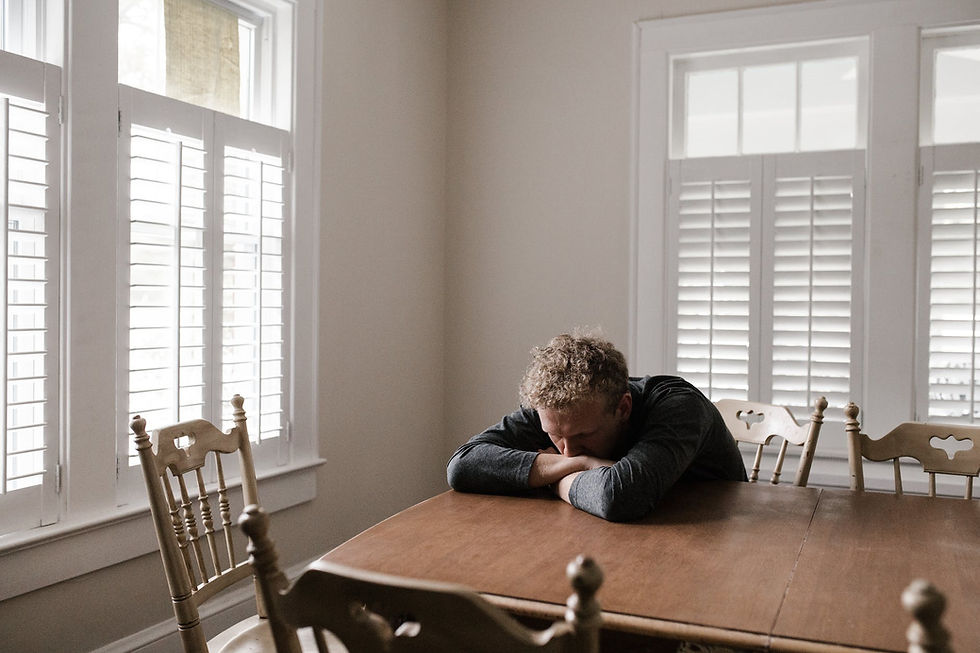My story of depression!
- Vamsy Krishna D

- Dec 31, 2022
- 3 min read
Updated: May 13, 2024
During covid time, the institution I’m working with was closed due to financial reasons and left me jobless for an year now. Initially, I felt sad and it continued for months and turned to be depressive episodes.
What is depression?
Depression is different from normal mood swings and emotions which re short lived due to challenges we face in everyday life events. It varies from moderate to severe intensity, depression can become more serious health condition and can cause pain and suffering and may affect the functions in different life spheres like; work, family & school etc., in worst cases and treatment not met may lead to extreme steps of suicide.
In young population (15-29 yrs) Suicide is the fourth leading cause of death, for about 700 000 people die due to suicide every year.
For about 75% of people belonging to low and developed countries receive No proper and sometimes no treatment was received although there are effective treatment know to cure mental health disorders.
Here are few warning signs to look for:
Trouble in concentration, memory and making decisions
Tiredness, excessive feelings of guilt, worthlessness, and helplessness
Negative out set of world and hopelessness
Sleep too little or too much which results in Restlessness & irritability
Loss of interest in things once pleasurable, including sex
Overeating or loss of appetite
Weakness
Constipation and digestion related issues.
Persistent “empty” feeling
Suicidal thoughts or suicide attempts
How my depression felt like and how I came out of it:
I either I sleep excessively or I don’t (insomnia), I lost interests in activities that used to be enjoyable before. My helplessness grown with time and situations. I had persistent thoughts of something bad happening. The severity is so much that I had to address in my therapy.
I used to get suicidal thoughts or self-harm thoughts, few days I couldn’t take care of myself and family like before and that in turn triggered a lot of guilt.
I had no hope for the future and couldn’t move out of the bed sometimes. All these situations increase my pain and I felt no one is out there to help.
I lived with depression for few months and addressed in my therapy by applying CBT and extreme case with meds. It feels very helpless and negative thoughts keeps coming and disturbs the normal life. After the therapy by I came out of the depression by constant support from my wife, friends and therapist which helped me in changing my thoughts and situations.
Identification of negative cognitions:
My therapist helped in dealing with dysfunctional or distorted ideation associated with the problematic areas. I recorded my thoughts and initially its challenging to keep up with work. Later, my thoughts were challenged and gave rationale to seek help and importance doing tasks that were given in therapy, which demonstrated relationship between thinking, feeling and behaving. At first, I tried to understand the link between thoughts an emotions/feeling and tried to identify the dysfunctional or negative cognitions.
Detection of automatic thoughts:
After understanding the role of cognition, I understood the important to recognise the presence of automatic thoughts.
Cognitive Behavioural therapy (CBT) for depression:
The basic model depicting the interrelationships among thoughts, feelings, and behaviours is displayed in the figure.
The focus of Cognitive theory is on thought processes that become habitual and automatic. These automatic thoughts are believed to differ depending on the specific psychological problems a person is experiencing.
Targeting following types of symptoms can address the state of being depressed during the therapy.
Affective symptoms: Induced anger, diversion, use of humour, limiting the feelings of uneasiness, uncontrollable crying spells, guilty feelings, shame etc.,
Motivational symptoms: Loss of positive motivation, Increased dependency
Cognitive symptoms: Indecisiveness, Overwhelmed view point o problems, Self-criticisms & All or none thinking pattern
Behavioural symptoms: Passivity, avoidance and inertia, Impaired coping with practical problems, social skills deficits
Physiological symptoms: Sleep disturbances, Appetite and sexual disturbances
Social context: Lack of gratification, negative vies about the world.
In my advice, it is always beneficial to take professional help so in case you think you need professional assistance get in touch with me. here is the link to book an appointment with me.

Comments